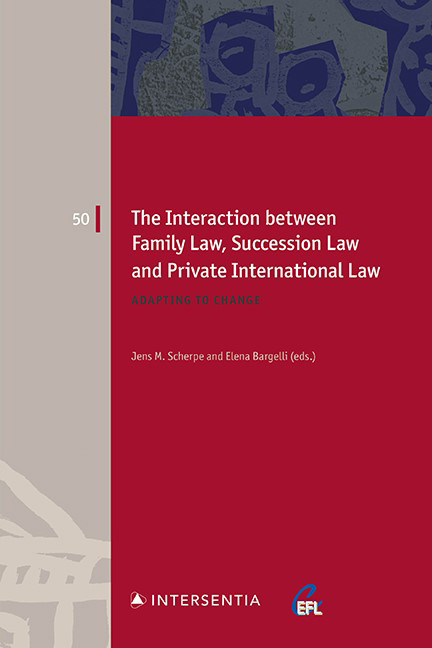Book contents
- Frontmatter
- Acknowledgements
- Contents
- List of Cases
- List of Contributors
- The Interaction between Family Law, Succession Law and Private International Law: An Introduction
- PART I THE IMPACT OF DEVELOPMENTS IN NATIONAL FAMILY LAWS ON EU PRIVATE INTERNATIONAL LAW
- PART II THE IMPACT OF EU PRIVATE INTERNATIONAL LAW ON NATIONAL FAMILY LAWS
- PART III THE IMPACT OF NATIONAL SUCCESSION LAWS ON EU PRIVATE INTERNATIONAL LAW
- PART IV THE IMPACT OF EU PRIVATE INTERNATIONAL LAW ON NATIONAL SUCCESSION LAWS
- Index
- European Family Law Series
The Impact of Private Divorces on EU Private International Law
Published online by Cambridge University Press: 25 May 2021
- Frontmatter
- Acknowledgements
- Contents
- List of Cases
- List of Contributors
- The Interaction between Family Law, Succession Law and Private International Law: An Introduction
- PART I THE IMPACT OF DEVELOPMENTS IN NATIONAL FAMILY LAWS ON EU PRIVATE INTERNATIONAL LAW
- PART II THE IMPACT OF EU PRIVATE INTERNATIONAL LAW ON NATIONAL FAMILY LAWS
- PART III THE IMPACT OF NATIONAL SUCCESSION LAWS ON EU PRIVATE INTERNATIONAL LAW
- PART IV THE IMPACT OF EU PRIVATE INTERNATIONAL LAW ON NATIONAL SUCCESSION LAWS
- Index
- European Family Law Series
Summary
PRIVATE DIVORCES: A GROWING PHENOMENON IN EUROPE
Several EU Member States no longer limit marriage dissolution to judicial decisions. Private divorces, which aim to increase the autonomy of the parties and have the same effects as judicial decisions as a result of supervision by a public authority, are currently allowed in many EU Member States, including Belgium, Estonia, France, Greece, Italy, Latvia, Portugal, Romania, Slovenia and Spain.
1. agreements on economic matters, such as spousal and child maintenance; and/or
2. (in the case of couples with children) child custody arrangements, for instance, on the exercise of parental responsibilities such as visitation rights.
Despite private divorces becoming more common in Europe, only general observations are possible with respect to their effects and content, as their features differ significantly in the various national legal rules.
In many cases, private divorces are conceived as an alternative to judicial consensual proceedings, but sometimes they are the only way to get consensual divorce.
In some cases, private divorces only are available for couples without minor children, whereas in others they are also available for couples with such children.
The supervising public authority also differ: sometimes they are dealt with by notaries, sometimes by civil status officers or public prosecutors.
All these differences of course also have a private international law dimension (on which see sections 3.1 – 3.4 below).
In the following, and by way of an example, the provisions for private divorces in Italy, Spain and France will be considered.
ITALY
In Italy since 2014, private divorces (introduced by Legislative Decree No 132 of 12 September 2014, converted, with amendments, into Law No 162 of 10 November 2014) added two non-judicial alternatives to the existing judicial divorces, both of which still include contentious and consensual procedures.
Specifically, when both spouses agree, the couple can divorce through a non-judicial procedure if the substantial requirements listed in Italian divorce law are fulfilled:
1. By an agreement signed before a civil status officer if the couple has no children under 18 or with disabilities or who are not economically self-sufficient (Article 12 of Law No 162 of 2014).
- Type
- Chapter
- Information
- The Interaction between Family Law, Succession Law and Private International LawAdapting to Change, pp. 59 - 76Publisher: IntersentiaPrint publication year: 2021

